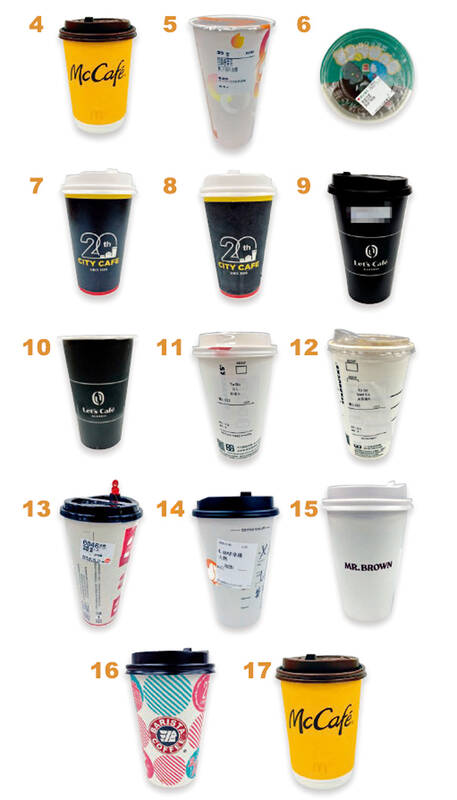A safety test showed that to-go cups likely meet heat resistance safety standards, the Consumers’ Foundation said yesterday, following concerns that hot beverages might cause the containers to shed microplastics.
The foundation carried out the test in September last year.
It ordered hot drinks served in 30 cups used by popular convenience stores, fast-food restaurants, cafes and bubble tea vendors in Taipei and New Taipei City, the foundation said.

Photo courtesy of the Consumers’ Foundation
The samples included six cups that contained sugar-free beverages and 24 that contained sweet beverages, it said.
The research was conducted in response to inquiries from members of the public who were concerned about the plastic membrane on single-use paper cups that has become common after a national ban on plastic cups, the foundation added.
Many consumers were worried that there was a sugar substitute in their drinks after tasting sweetness in sugar-free hot drinks they ordered, it said.
Labs found that every cup tested met national safety standards, with 29 cups showing no signs of microplastics contamination, the foundation said.
Barista Cafe’s to-go cup that contained a hot latte tested positive for the plasticizer dibutyl phthalate, but the concentration of 0.06 parts per million was well under the legal safety limit, it said.
No sugar-free drinks tested positive for sugar substitutes, including the tapioca in 11 samples, the foundation said.
Plastic containers could leach plasticizers after being in contact with oil, high temperatures or after prolonged use, the foundation said, adding that stainless steel or ceramics are the safest food containers.
Milk contains 4.9 percent lactose, a naturally occurring sugar, which makes any beverage containing milk taste sweet, it said.
Consumers should check the sweetness scale at vendors, as many businesses label drinks with the highest possible amount of sugar added as “normal” sweetness, it said.

DEFENSE: The National Security Bureau promised to expand communication and intelligence cooperation with global partners and enhance its strategic analytical skills China has not only increased military exercises and “gray zone” tactics against Taiwan this year, but also continues to recruit military personnel for espionage, the National Security Bureau (NSB) said yesterday in a report to the Legislative Yuan. The bureau submitted the report ahead of NSB Director-General Tsai Ming-yen’s (蔡明彥) appearance before the Foreign and National Defense Committee today. Last year, the Chinese People’s Liberation Army (PLA) conducted “Joint Sword-2024A and B” military exercises targeting Taiwan and carried out 40 combat readiness patrols, the bureau said. In addition, Chinese military aircraft entered Taiwan’s airspace 3,070 times last year, up about

A magnitude 4.3 earthquake struck eastern Taiwan's Hualien County at 8:31am today, according to the Central Weather Administration (CWA). The epicenter of the temblor was located in Hualien County, about 70.3 kilometers south southwest of Hualien County Hall, at a depth of 23.2km, according to the administration. There were no immediate reports of damage resulting from the quake. The earthquake's intensity, which gauges the actual effect of a temblor, was highest in Taitung County, where it measured 3 on Taiwan's 7-tier intensity scale. The quake also measured an intensity of 2 in Hualien and Nantou counties, the CWA said.

The Overseas Community Affairs Council (OCAC) yesterday announced a fundraising campaign to support survivors of the magnitude 7.7 earthquake that struck Myanmar on March 28, with two prayer events scheduled in Taipei and Taichung later this week. “While initial rescue operations have concluded [in Myanmar], many survivors are now facing increasingly difficult living conditions,” OCAC Minister Hsu Chia-ching (徐佳青) told a news conference in Taipei. The fundraising campaign, which runs through May 31, is focused on supporting the reconstruction of damaged overseas compatriot schools, assisting students from Myanmar in Taiwan, and providing essential items, such as drinking water, food and medical supplies,

New Party Deputy Secretary-General You Chih-pin (游智彬) this morning went to the National Immigration Agency (NIA) to “turn himself in” after being notified that he had failed to provide proof of having renounced his Chinese household registration. He was one of more than 10,000 naturalized Taiwanese citizens from China who were informed by the NIA that their Taiwanese citizenship might be revoked if they fail to provide the proof in three months, people familiar with the matter said. You said he has proof that he had renounced his Chinese household registration and demanded the NIA provide proof that he still had Chinese